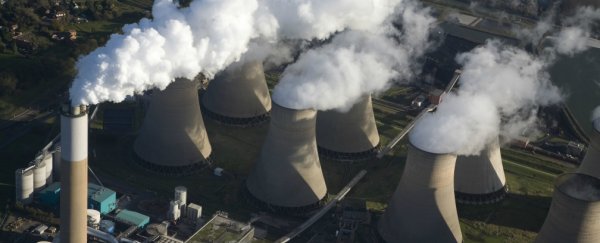New Zealand electricity company Genesis Energy has announced that it will shut down its last two coal-fired power generators by December 2018 - a bold step towards the country's goal of being powered by 90 percent renewable energy by 2025.
The decision means that, with the exception of a few small-scale industrial plants, the country will no longer be burning coal to generate electricity, and will stop pumping around 1,600 kilotonnes of CO2 into the atmosphere within three years. "Its closure marks the end of coal-fired power generation in New Zealand," the Energy and Resources Minister Simon Bridges said in a press release.
Because the majority of New Zealand's energy already comes from geothermal, hydro, and natural gas, giving up coal isn't as big a deal as it would be for other countries (*cough* Australia, the United States *cough*), but the move is still a significant step towards a world where burning coal is no longer the cheapest and most reliable way to generate electricity.
"Historically, coal has played an important role in ensuring the security of New Zealand's electricity supply, particularly in dry years where our hydro-lake levels are low," said Bridges. "But significant market investment in other forms of renewable energy in recent years, particularly in geothermal, means that a coal backstop is becoming less of a requirement."
What's really cool is that the decision was made by Genesis Energy solely on the basis of profits, and not as a result of new government legislation. Although it would be nice to see governments force coal-fired power stations out of business, it actually feels more exciting that coal-fired systems no longer make financial sense.
In fact, Genesis Energy Chief Executive Albert Brantley estimated in a press release that the company will save around NZ$20 to 25 million (US$13 to 16.5 million) each year by not running the coal-fired generators.
The two remaining coal-burning generators are located at Genesis Energy's Huntly Power Station in Waikato on the country's North Island. The power station itself will continue to run on natural gas for the foreseeable future.
Over the past year and a half, New Zealand has significantly increased the amount of electricity it produces from renewable energy, with nearly 80 percent of its electricity coming from renewable sources in 2014 thanks to huge expansion in geothermal. In comparison, the average OECD country only gets 22 percent of its electricity from renewables.
"Geothermal generation has more than doubled over the past decade, and for the first time in 40 years, geothermal electricity generation contributed more electricity than natural gas during 2014," Bridges announced to the press. "New Zealand's share of renewable electricity generation is already the fourth largest in the world and the shift from coal will help us to achieve our ambitious goal of having 90 percent of New Zealand's electricity supply generated by renewables by 2025."
Obviously the country's significant geothermal activity and small population gives it a unique advantage when it comes to renewable energy. But if recent research has shown us anything, it's that there are plenty of renewable energy sources out there to be exploited, and every country on Earth has more than enough to go around. We just need to follow New Zealand's lead, and start investing in renewables now - because even if you don't give a damn about the environment, it's still a smart business move.
